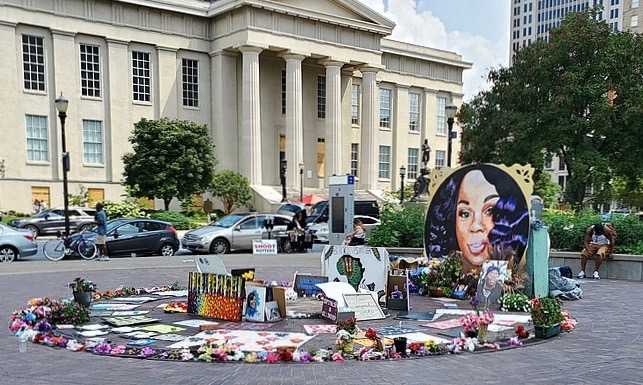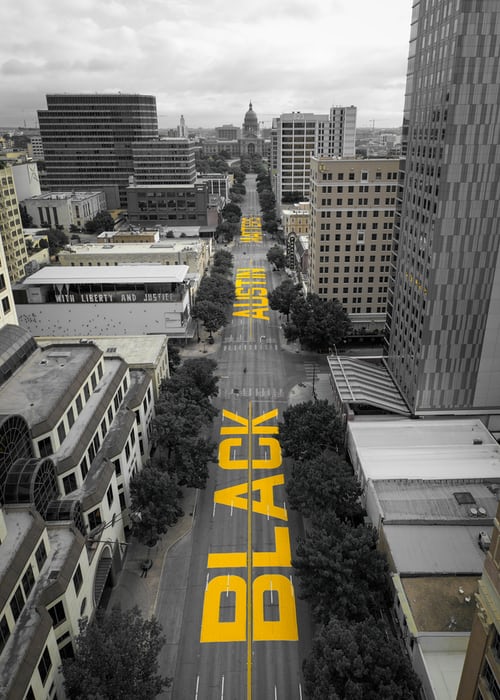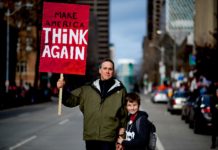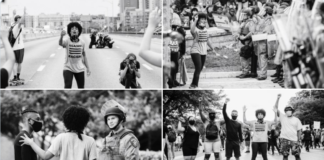
Photo: FloNight via Wikimedia
The new release of taped grand jury deliberations in the still-murky case of Breonna Taylor, the innocent 26-year-old Black woman brutally gunned down by Louisville police in a botched assault, is welcome if overdue. But the early picture of chaos, confusion and trigger-happy police that emerged with the release of those tapes on Oct. 2 only adds urgency to calls for police reform in Austin, Texas and America.
Just one amid the many recent cases of police recklessness in their dealings with Black Americans, Taylor died March 14 after police mistakenly raided her home and fired 31 bullets into the apartment after her boyfriend – fearing for the couple’s safety – fired at what he thought were unannounced intruders. The Kentucky Attorney General announced Sept. 23 that three of the officers would not be criminally charged. One officer, already fired for his conduct the day of the shooting, faces the lesser charge for misfiring bullets into a nearby apartment. Taylor’s death, which preceded the vigilante killing of Ahmed Arbury in Georgia and the police murder of George Floyd in Minneapolis, helped to galvanize the watershed protests that have swept much of America (and parts of the world) since May 25.
Breonna Taylor’s case reverberates in Austin for several reasons, including the unresolved police killing of unarmed Michael Ramos the month after Taylor was killed in her own home. The issue of criminal justice reform and prospects for reimagining public safety have become especially politicized this election season. The City Council’s thoughtful, and by no means revolutionary or irresponsible, decision to reduce Austin Police Department funding by five percent in order to invest in public safety measures that will help low income and communities of color has been wildly distorted by opponents.
Sadly, yard signs demanding the mayor’s recall and ad hominem attacks directed at local officials courageous enough to understand that the status quo is intolerable, are in fact part of Breonna Taylor’s America. So too, however, is the heroic work to ensure communities of color are able to flourish in Austin that is being done by local social justice organizations committed to turning dreams of an antiracist future into a political reality. Taylor’s case touches granular, pragmatic, and abstract visions of a liberated political future tied to fundamentally transforming America’s justice system.
Benjamin Crump, the attorney representing Taylor’s family, publicly requested the release of the grand jury transcripts, decrying the nation’s racially divided justice system. The optics of the non-indictment, delivered by Daniel Cameron, Kentucky’s first Black attorney general and a rising Republic star mentored by Senate Majority leader Mitch McConnell, added further insult to injury. Republic officials who hoped that Cameron’s racial identity might shield him and Kentucky law enforcement from charges of racial bias were mistaken.
Louisville’s reported $12 million settlement with the Taylor family, who filed a civil suit against the city following her death, has brought neither peace nor justice to the city or the nation.
Protesters, ranging from Black Lives Matter activists to social justice, church, and civic leaders, descended on downtown Louisville, demonstrations that resulted in 127 arrests and the non-fatal shooting of two police officers.
Around the nation, from Portland, Maine to Los Angeles, California demonstrators chanted Taylor’s name as they bore witness to the latest example of unequal justice that gave spark to the BLM movement. “There are Breonnas everywhere,” read one sign in Norfolk, Virginia.

Photo: Ryan Magsino via Unsplash
We are all living in Breonna Taylor’s America now. Where troubling signs of systemic police brutality, abuse, and killing of Black Americans are papered over by suggestions that only a few bad apples are at the root of the problem. Where police unions brazenly support a sitting president who revels in promoting racial division and fanning the rhetorical flames against social justice protesters. Where racist terrorists shoot unarmed demonstrators in Kenosha, Wisconsin and are hailed by some on the right as heroes. A nation where peaceful protesters face assault from the police, vigilantes, even angry motorists who have, in a grotesque echo of the vehicular assault that left one woman dead in Charlottesville, Va. in 2017, plowed into BLM demonstrations. Where the president wields ancient racial hatreds like a scythe to cut through intersectional solidarities that might lead to the creation of a more just society.
But Taylor’s America also has another face. Her visage graces the cover of the latest Vanity Fair issue, guest edited by author Ta-Nehisi Coates. The entire issue is devoted to interrogating the roots, causes, and potential aftermath of our current moment of political and moral reckoning around race, what the poet Eve L. Ewing calls the “great fire.” That fire, born out of the nation’s original sin, can be creatively destructive.
Tamika Palmer, Breonna’s mother, recounts the small details—her daughter’s love of the blues and motorbikes—that offer a window into a life cut short by police violence. Palmer was not allowed to see her daughter’s body until over 24 hours after police had riddled over thirty bullets through her apartment. When Palmer initially met with detectives they led her to believe, erroneously it turned out, that Breonna might have been a victim of either domestic or random violence. Louisville’s mayor contacted the Taylor family only after they filed a lawsuit and by the time Breonna’s story went viral the funeral had already passed. Palmer’s narration of her daughter’s “beautiful life,” is simultaneously heartbreaking and hopeful.
I remain an optimist whose faith is bolstered by squarely confronting the depth of systemic racism’s power over American institutions and White supremacy’s uncanny grip on the nation’s soul. There is a hard won progress in the posthumous, global commemoration of Taylor’s life. In death she has become perhaps the first truly venerated Black women martyr of the centuries long movements for Black life. The insistence that Black people matter is one that takes more granular shape and more complex shades when refracted through the lives of Black women. Hierarchies abound within caste systems and Black women’s lives and deaths have too often denied the kind of collective national mourning capable of changing racist policies as well hearts and minds.
Breonna Taylor’s America is Janus-faced. On the one hand it remains bound by a history of racial injustice that remains a permanent feature of our landscape, a festering wound that refuses to heal so long as so many deny the fact of its existence. Taylor’s death, in the early morning hours of March 14, 2020, unwittingly helped to lead us to this moment of national reckoning. This march toward becoming a country capable of loving Black people enough to let justice burst forth through every nook and cranny of our democratic institutions is a painfully difficult one. A painful rebirth that might allow us to achieve a new country that is capable of honoring Breonna Taylor in life as much as we have in death.





